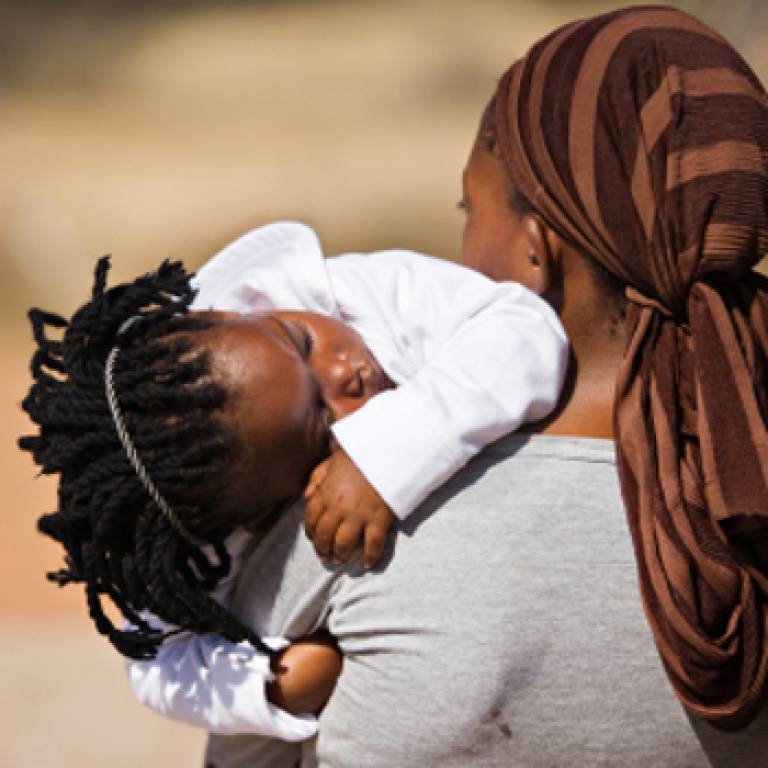UCL study: improving maternity care in Africa
23 September 2009
Links:
 ucl.ac.uk/operational-research/" target="_self">UCL Clinical Operational Research Unit
ucl.ac.uk/operational-research/" target="_self">UCL Clinical Operational Research Unit
Improving health facilities and access to drugs could mean 60,000 fewer maternal deaths in Africa per year from post-partum bleeding and sepsis, according to a UCL study.
The findings of the study by Dr Christina Pagel (UCL Clinical Operational Research Unit), Professor Anthony Costello (UCL Institute of Child Health) and colleagues appear in The Lancet.
Maternal mortality ratios have changed little since 1990 and progress towards Millennium Development Goal 5 - to improve maternal health - is far off track in sub-Saharan Africa: the maternal mortality rate has fallen by only 16 deaths per 100,000 since 1990 (921 per 100,000 livebirths in 1990 to 905 per 100,000 in 2005).
Dr Pagel, Professor Costello and colleagues developed a mathematical model to assess the extent to which a combination of improving health facilities and community-based access to life-saving drugs could reduce maternal mortality due to post-partum haemorrhage or sepsis.
Three possible 'packages' of improvements were studied:
- Package 1 - ensuring that health facilities are supplied with oxytocin - a hormone that plays an important role in giving birth - to prevent post-partum haemorrhage and antibiotics to treat sepsis.
- Package 2 - package 1 combined with improved drug provision via antenatal-care appointments and community health workers. Drug provision entailed distribution of misoprostol (and instructions on how to take it) to women attending outreach antenatal-care appointments, provided that the drug was in stock. Misoprostol is a heat-stable drug that can prevent post-partum haemorrhage and is easily given in tablet form. This package also included distribution of antibiotics by community health workers to women presenting with signs of postnatal infection.
- Package 3 - packages 1 and 2 combined with additional access to misoprostol and antibiotics via female volunteers in villages, to ensure maximum coverage of these interventions, especially in rural areas.
Using the model the researchers estimated that of 2,860 maternal deaths from post-partum haemorrhage or sepsis per year in Malawi, intervention package one could prevent 210 (7%) deaths, package two 720 (25%), and package three 1,020 (36%).
In sub-Saharan Africa, the authors estimated that of 182,000 such maternal deaths per year, these three packages could prevent 21,300 (12%), 43,800 (24%), and 59,000 (32%) deaths, respectively. The estimated effect of community-based drug provision was greatest for the poorest women.
Professor Costello said: "Our model shows that in Malawi (even under pessimistic coverage estimates) and across sub-Saharan Africa, improved access to misoprostol and antibiotics through feasible community interventions could have substantial benefit in reduction of maternal deaths due to post-partum haemorrhage or sepsis after delivery."
The study calls for formal assessment and investigation to gain strong evidence of the effect of improved access to drugs in community settings and information about their appropriate use and side-effects.
For more information follow the links above.
Image: mother and child in sub-Saharan Africa
UCL context
UCL's research strategy defines Grand Challenges as areas in which the university is facilitating cross-disciplinary interaction - within and beyond UCL - and applying its collective strengths, insights and creativity to overcome problems of global significance. The first of these is the Grand Challenge of Global Health.
Related stories:
Biodiversity loss is undermining global development
UCL podcast: Motherhood in the 21st Century
 Close
Close

